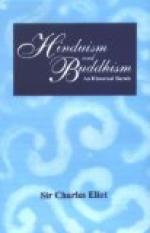Hou-Ching proceeded to the palace, but,[638] overcome with awe, knelt down before Wu-Ti who merely said, “I am afraid you must be fatigued by the trouble it has cost you to destroy my kingdom.” Hou-Ching was ashamed and told his officers that he had never felt such fear before and would never dare to see Wu-Ti again. Nevertheless, the aged Emperor was treated with indignity and soon died of starvation. His end, though melancholy, was peaceful compared with that in store for Hou-Ching who, after two years of fighting and murdering, assumed the imperial title, but immediately afterwards was defeated and slain. The people ate his body in the streets of Nanking and his own wife is said to have swallowed mouthfuls of his flesh.
One of Wu-Ti’s sons, Yuan-Ti, who reigned from 552 to 555, inherited his father’s temper and fate with this difference that he was a Taoist, not a Buddhist. He frequently resided in the temples of that religion, studied its scriptures and expounded them to his people. A great scholar, he had accumulated 140,000 volumes, but when it was announced to him in his library that the troops of Wei were marching on his capital, he yielded without resistance and burnt his books, saying that they had proved of no use in this extremity.
This alternation of imperial patronage in the south may have been the reason why Wen Hsuan Ti, the ruler of Northern Ch’i,[639] and for the moment perhaps the most important personage in China, summoned Buddhist and Taoist priests to a discussion in 555. Both religions could not be true, he said, and one must be superfluous. After hearing the arguments of both he decided in favour of Buddhism and ordered the Taoists to become bonzes on pain of death. Only four refused and were executed.
Under the short Ch’en dynasty (557-589) the position of Buddhism continued favourable. The first Emperor, a mild and intelligent sovereign, though circumstances obliged him to put a great many people out of the way, retired to a monastery after reigning for two years. But in the north there was a temporary reaction. Wu-Ti, of the Northern Chou dynasty,[640] first of all defined the precedence of the three religions as Confucianism, Taoism, Buddhism and then, in 575, prohibited the two latter, ordering temples to be destroyed and priests to return to the world. But as usual the persecution was not of long duration. Five years later Wu-Ti’s son withdrew his father’s edict and in 582, the founder of the Sui dynasty, gave the population permission to become monks. He may be said to have used Buddhism as his basis for restoring the unity of the Empire and in his old age he became devout. The Sui annals observe that Buddhist books had become more numerous under this dynasty than those of the Confucianists, and no less than three collections of the Tripitaka were made between 594 and 616.




